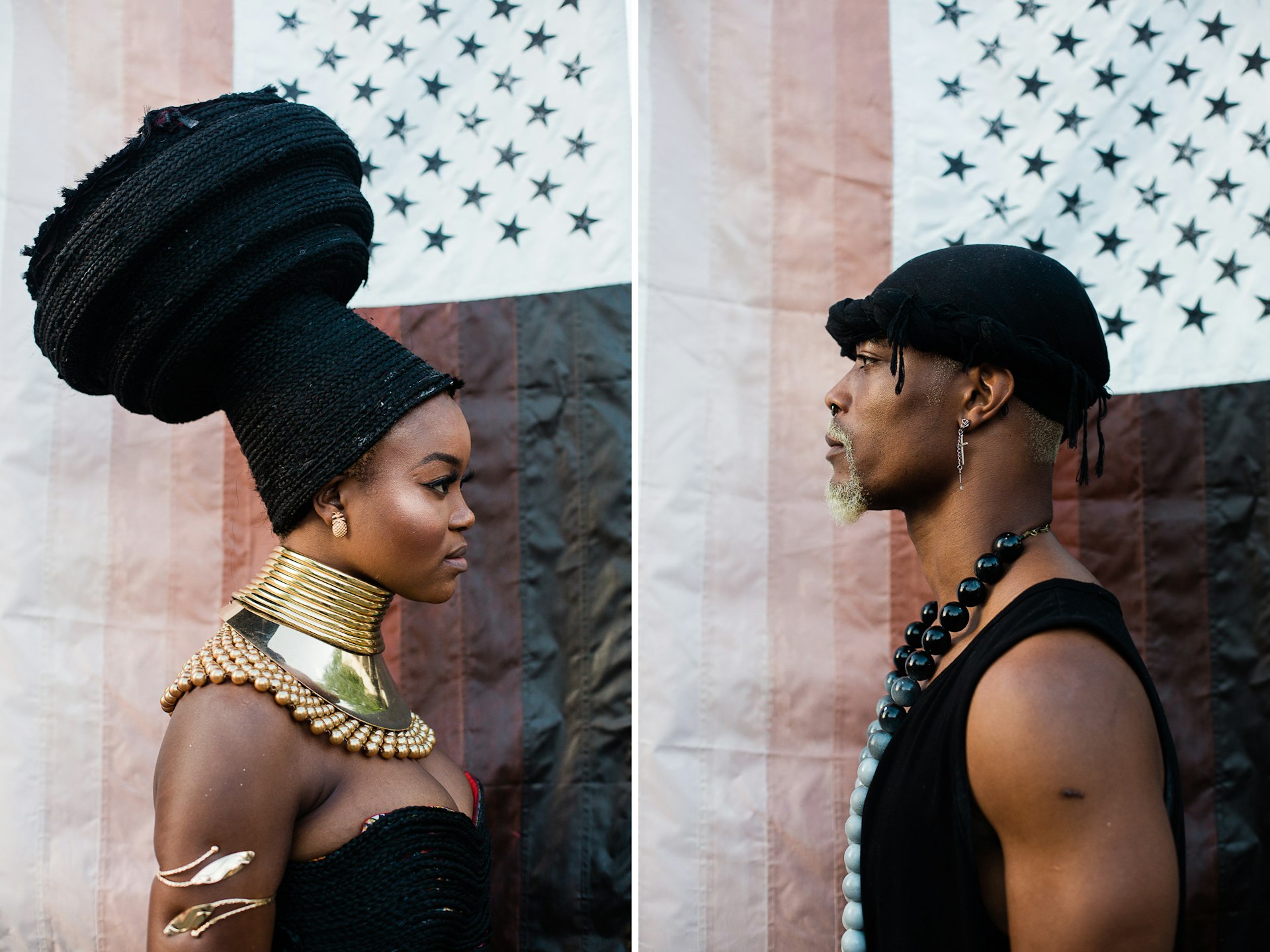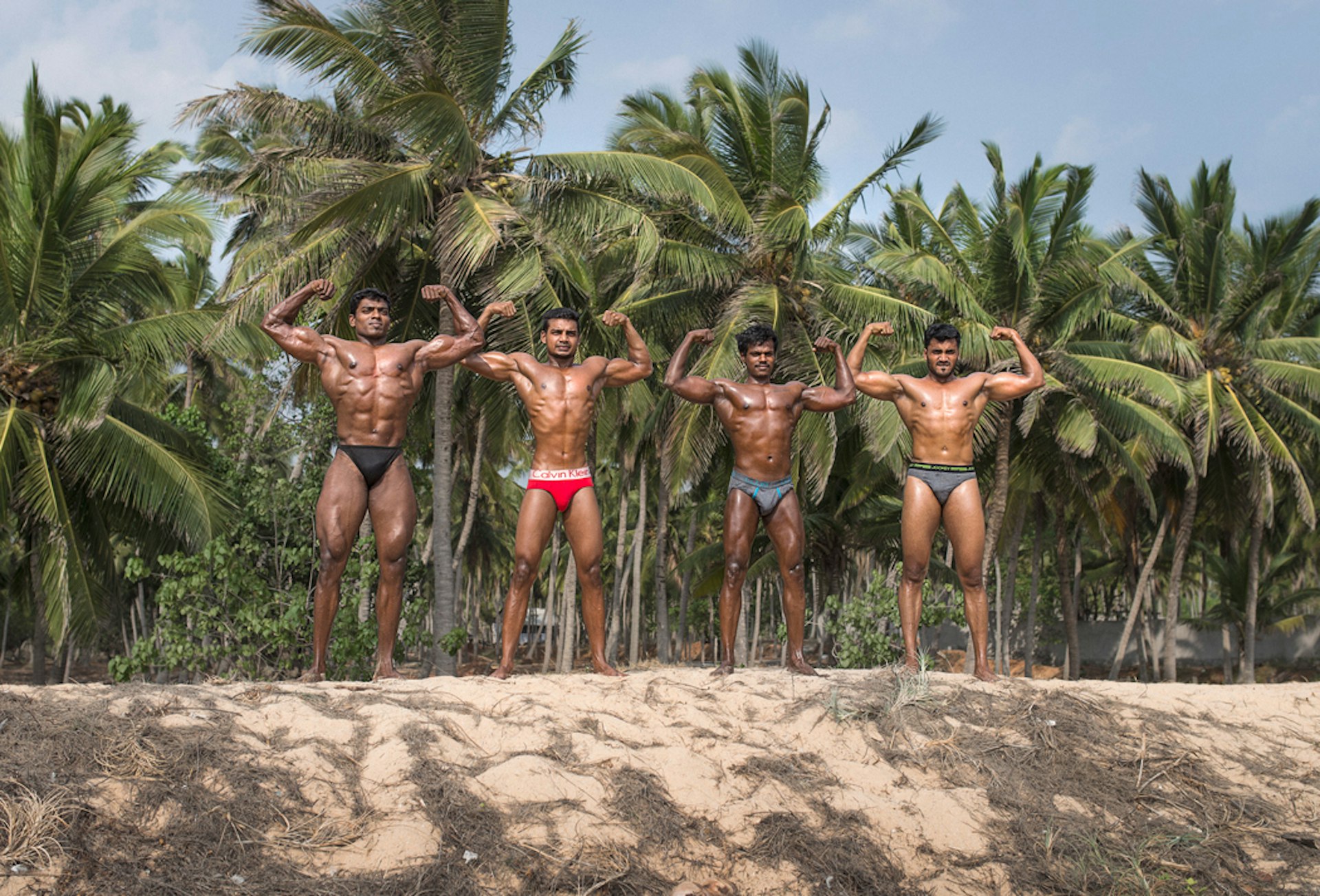
India’s bodybuilding boom reflects a changing nation
- Text by Alex King
- Photography by Mark Leaver
A group of twenty-something guys are crammed into a small room, flexing their muscles and applying thick layers of fake tan on dark brown skin. It’s approaching 40°C outside but, inside this windowless pen, it’s hard to breathe. Sweat is running freely and the air is thick with a tang of muscle spray as guys attempt to accentuate their bulges before stepping out on stage.
Bodybuilding is booming across India. Mr Universe-inspired competitions and gyms are popping up everywhere, from small towns in the middle of nowhere to megacities like Delhi and Mumbai.
In just over a decade, economic prosperity has transformed a struggling nation into a country developing at rapid speed, with smartphones becoming ubiquitous and tech hubs competing with the growth of Silicon Valley.
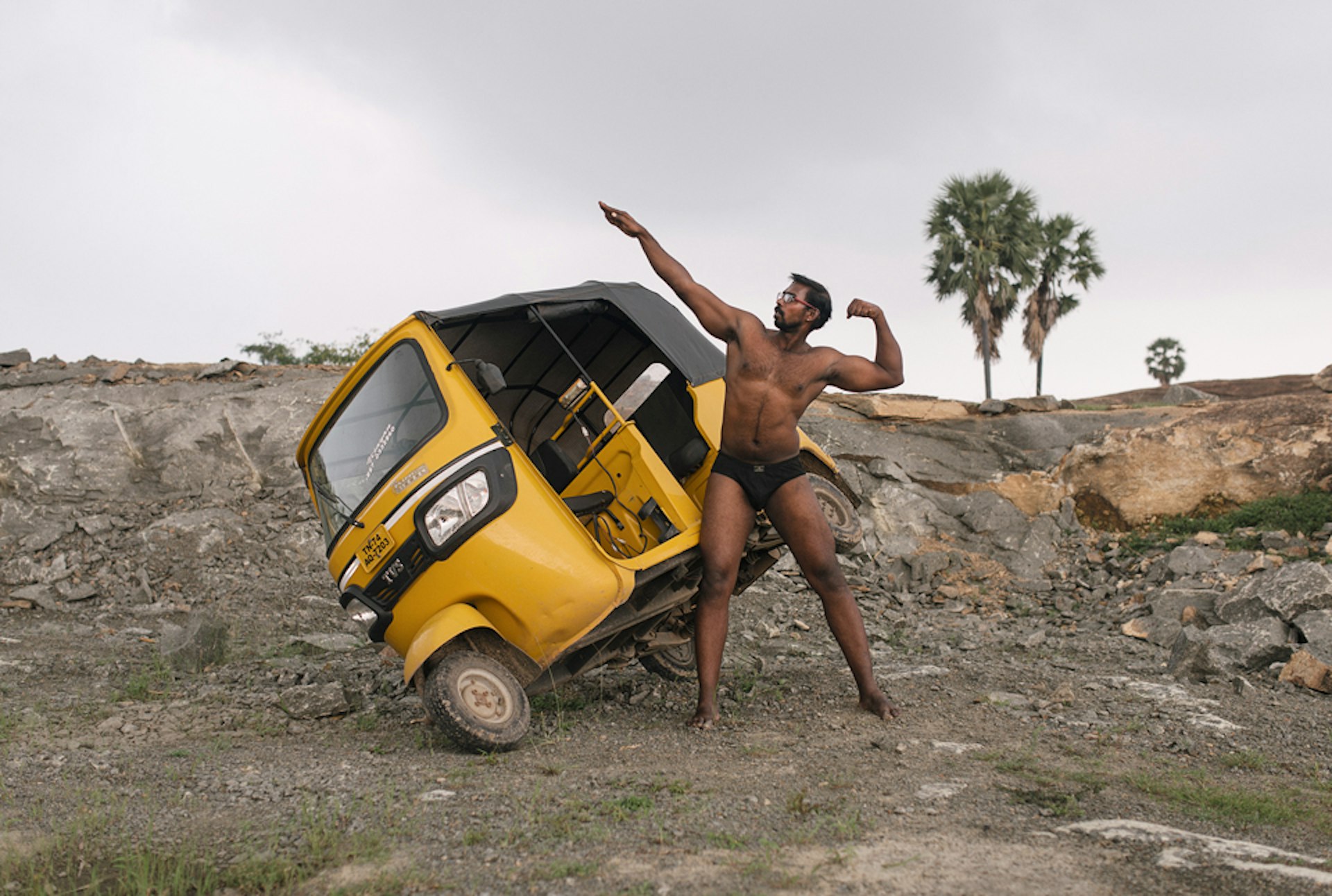
Vijayan, 31, flexing in front of his wheels.
The country has long viewed itself as a conservative society, shaped by Gandhi’s vision of a post-independence nation built from rural villages, but modern India looks increasingly urban and international.
Among its emerging middle-class is a wave of young men who see bodybuilding not only as a means to succeed financially, but as a source of identity. For many, the sport has become an all-encompassing way of life – one requiring a strict diet, rigorous training and significant financial backing.
![]()
Nagercoil is a sleepy town in the southernmost state of Tamil Nadu with a population of 250,000; it’s dotted with Christian churches and overlooked by the spectacular Western Ghat mountain range, rising up from green fields ringed by coconut trees.
It’s also home to Mr Tamil Nadu, a regional bodybuilding competition where, on a humid night in January, the event’s MC has whipped the crowd into a flurry of excitement.
A group of bodybuilders emerge with numbers pinned to their tight trunks, then spread out awkwardly in front of a brightly coloured banner covered in curly Tamil script. One-by-one, they’re called forward for a series of poses: showing off muscle growth and definition from their calves and shoulders to their arms and necks. They flex into each contortion as hard as they can, disguising the strain by gazing out at the audience with exaggerated smiles.
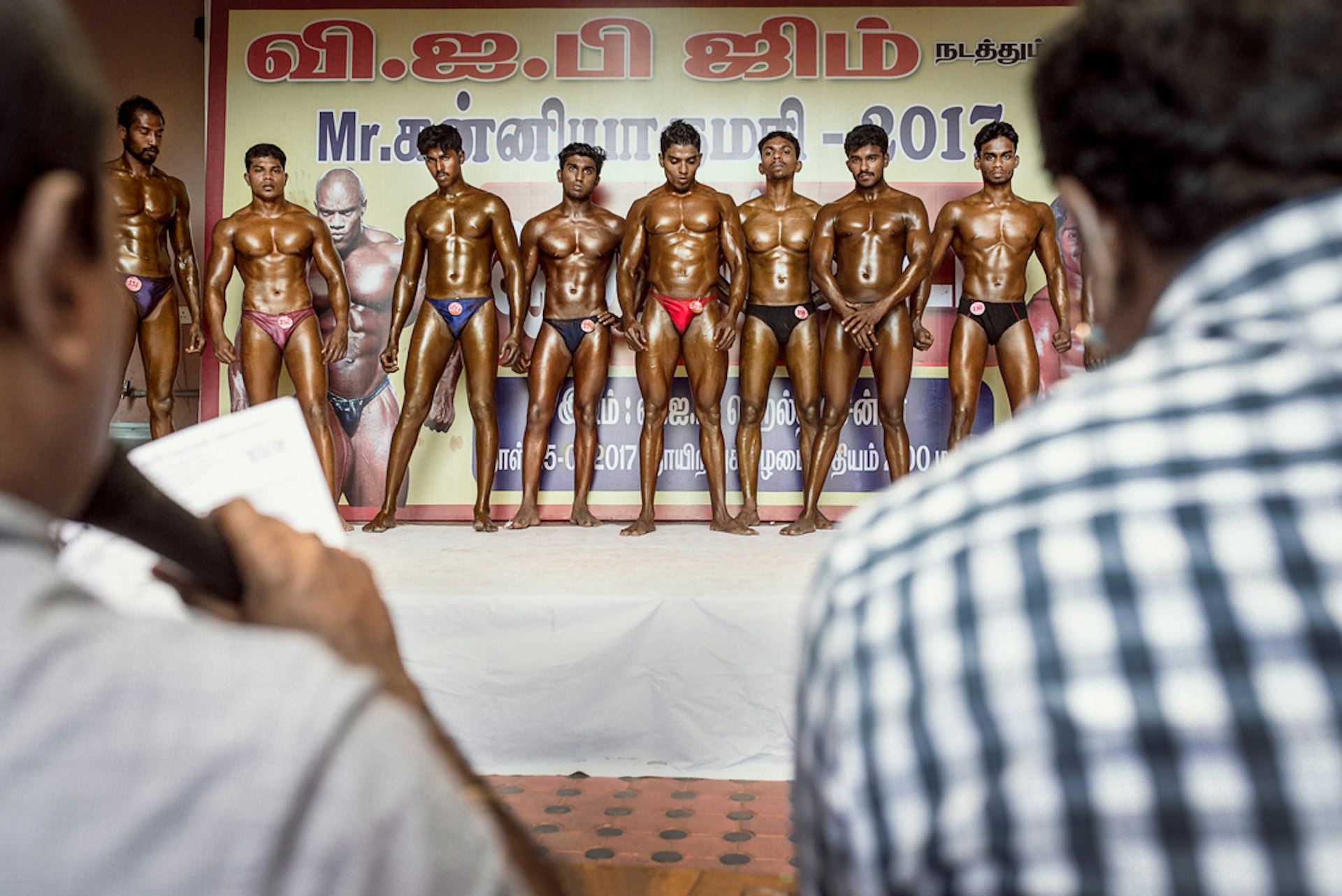
Aji stands centre-stage at Mr Tamil Nadu, moments before judges reveal the contest’s results.
One of the younger bodybuilders stands out immediately: 22-year-old Ajiith Kumar, otherwise known as Aji. He moves with a grace and confidence that none of the others possess – unsurprising, perhaps, given that he’s almost double the width of his smallest competitors.
Sure enough, Aji quickly trounces the competition to be crowned regional champion in his weight class, walking away with a trophy of a little gold man with rippling muscles. “I struggled to raise money for the diet, so I didn’t get enough protein,” he says afterwards, shaking his head earnestly. “But I didn’t skip a single workout or miss the gym. Next time, I will be better prepared.”
Aji’s promise was spotted early on by GM Chandru, the man who put Nagercoil on the bodybuilding map. He’s a cuddly 31-year-old who breaks into a chuckle at the memory of being a 10-year-old bodybuilding freak.
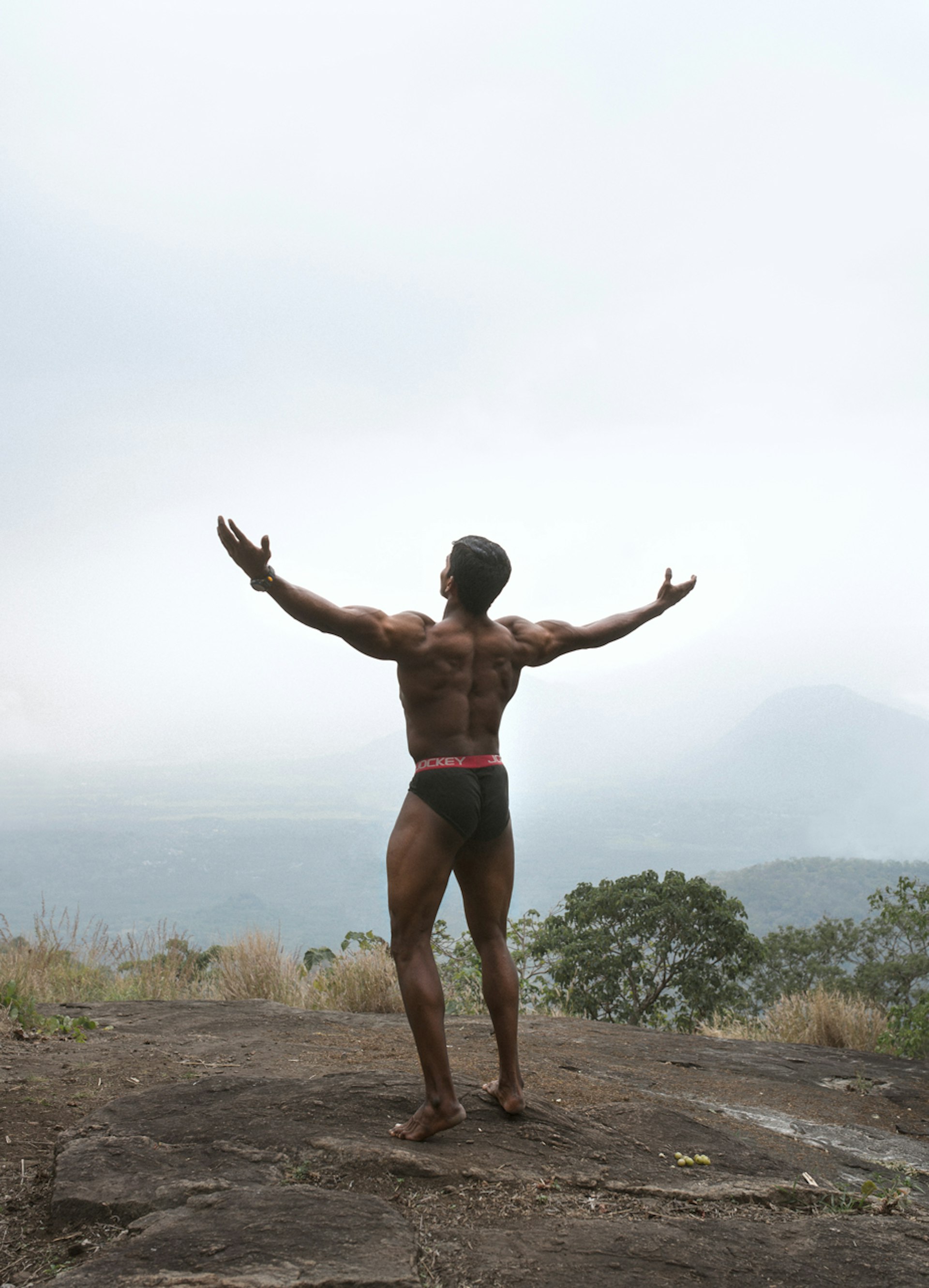
Aji celebrating the end of his training session at the summit.
His obsession was first sparked by the excitement of seeing local competitions up close, and cemented by early access to cable TV and the internet – a benefit of his father’s job as an engineer for the Indian Space Research Organisation.
GM began training as soon as he was old enough but, after some early success, a toxic cocktail of inferior supplements and steroid use began to give him serious health problems.
“Every young guy wants to develop their body but I didn’t find a proper trainer,” he says. “The chemicals they were giving me had some really bad effects. I got injured, my hormones went crazy and I got really fat, so I had to stop bodybuilding.
“It’s no secret that most of the guys here depend on some chemicals. But now I do my research and make sure that I give my guys the right supplements and advice, so they can build but don’t put themselves at risk.”
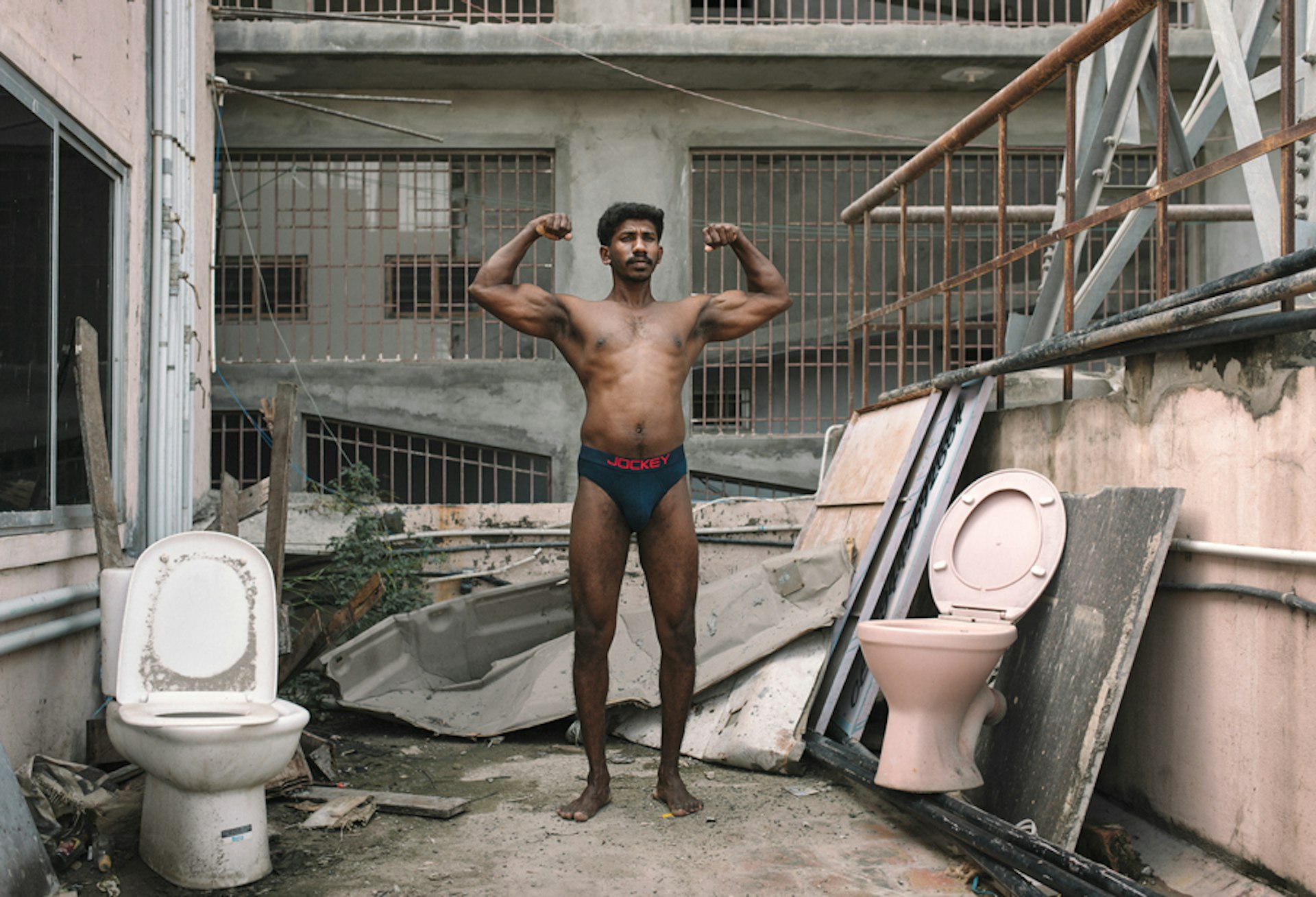
Siva Sakthi, 30, poses for his pre-competiton portrait.
GM’s commitment to training guys on meagre budgets has helped his gym become the most successful one in the area. It now occupies the entire third-floor of a building above a stationary shop, where, today, a gentle breeze provides some welcome respite from the stickiness outside.
Some of the guys are working through routines ahead of upcoming contests, but for most of them, it’s a place to hang out with friends. The walls are covered with motivational slogans – ‘Shut up and squat’ and ‘Milk is for babies, real men drink protein’ – while speakers blast a rotation of Tamil pop interspersed with the odd ’80s power ballad – the clang and clatter of weights and training machines occasionally rising above the noise.
GM sees a bright future for Aji, believing his protégé has the potential to progress at an international level. Winning the Mr Tamil Nadu contest is a pivotal step in that journey, as it earns Aji the chance to compete at Mr India. This is his last year as a junior, making the upcoming event his best chance to progress to Mr Asia and maybe even Mr Universe.
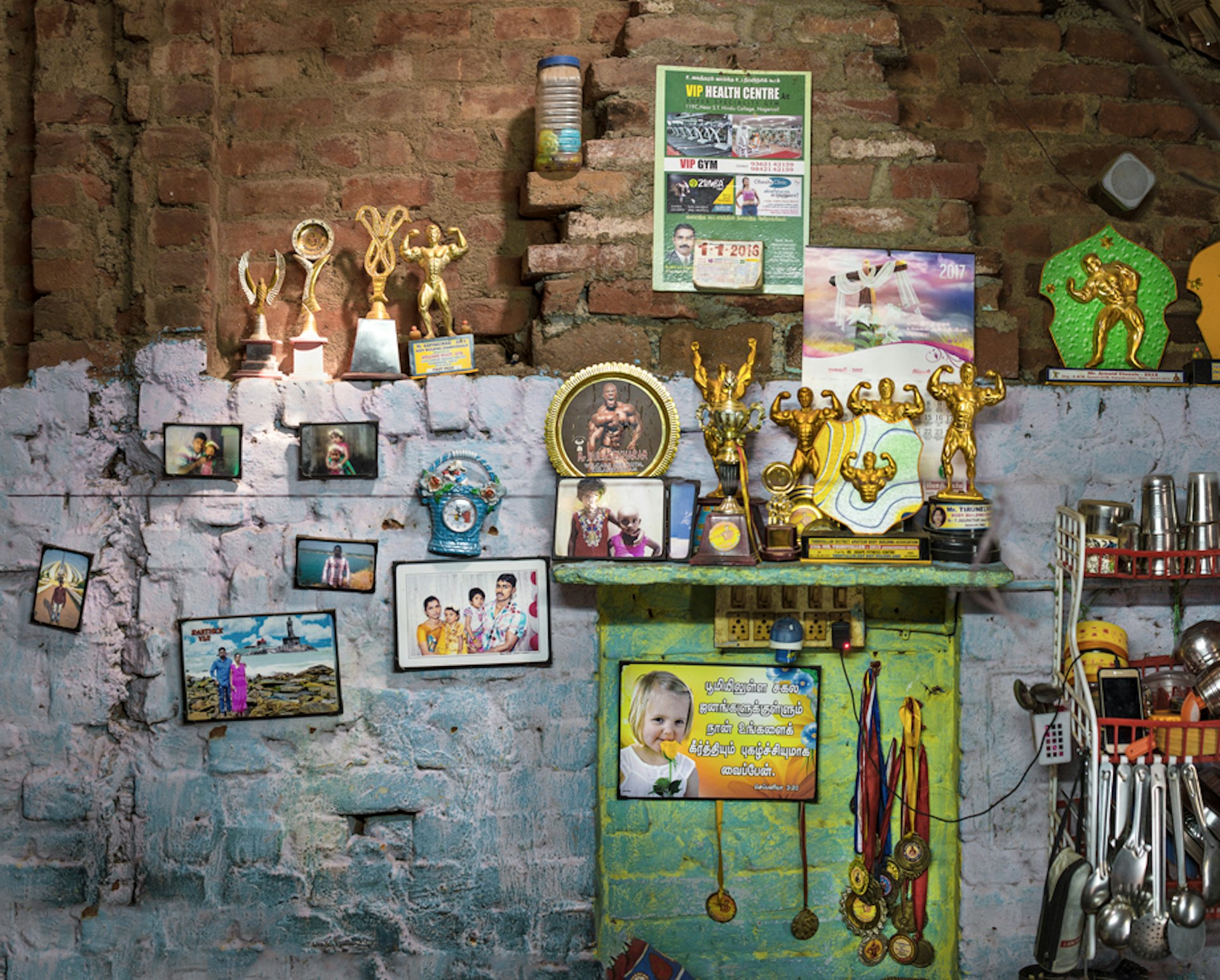
A mural of pride and inspiration spreading across Aji’s bedroom wall.
“Bodybuilding is a royal sport – and money is the backbone of everything,” GM explains. “Aji has great genetics but he’s from a poor family, so he can’t raise that much money until he progresses further.”
But a month before the competition, disaster strikes in the form of Cyclone Ockhi. It batters the region so intensely that trees lie uprooted in the streets, fisherman are reported missing and people protest the government’s insufficient response. The gym, meanwhile, is left completely flooded; its sign blown clear from the roof.
Two weeks later, Aji sits at home in a peaceful village half an hour outside Nagercoil. The power still hasn’t been reconnected and he’s on edge, attempting to hide his nerves. Despite the intimidating physique, off-stage he acts more reserved, even bashful at times.
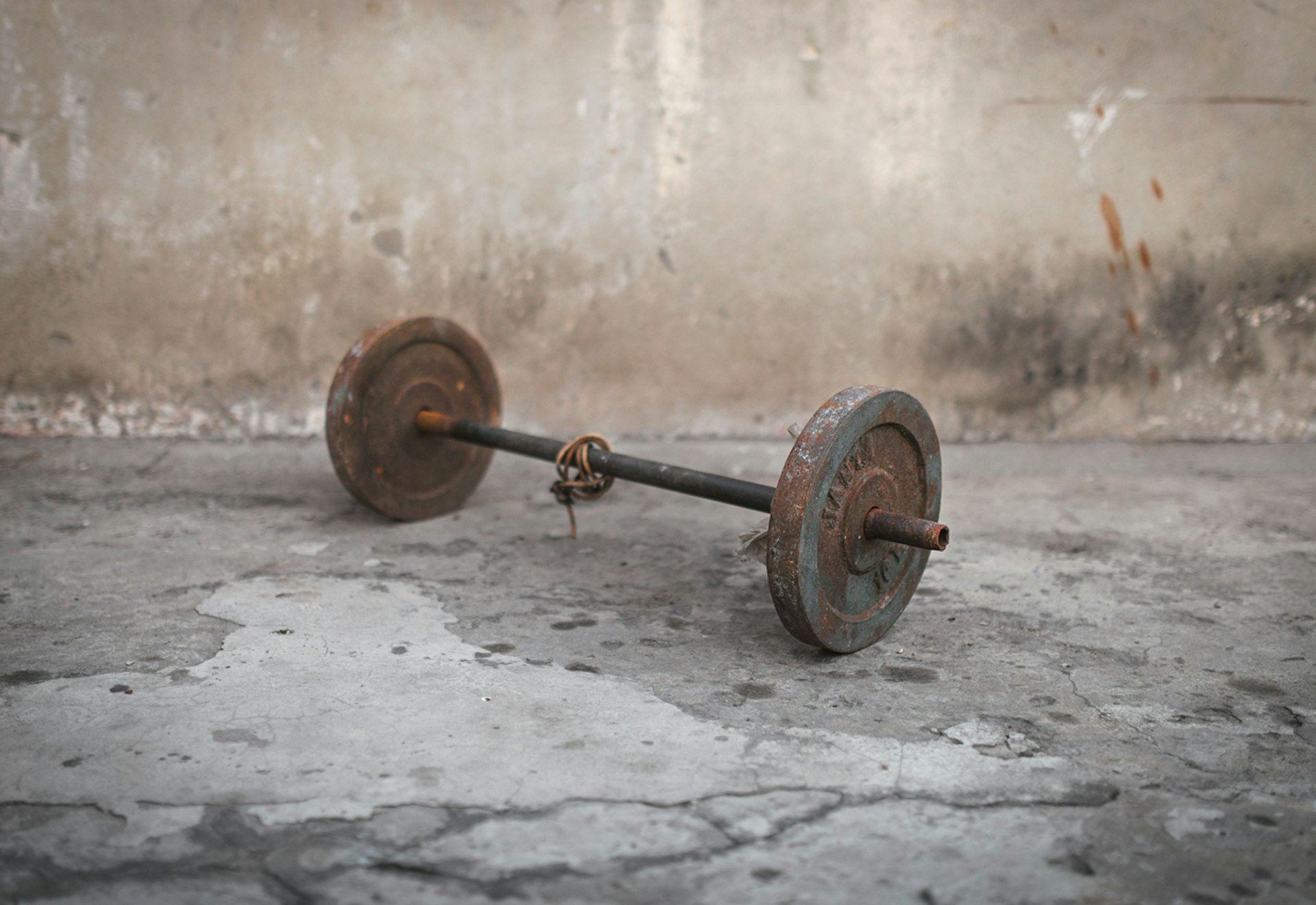
A make-shift barbell.
“I couldn’t leave the house [during the cyclone], so my muscles have relaxed,” Aji says quietly. “But I am always confident. I will win this competition, there’s no doubt about that.”
But for all of Aji’s faith in his own abilities, he can’t carry on much longer without sponsorship. It’s a must if he’s to continue training and lift the financial pressure from his family. It doesn’t help that few people understand his dedication.
“Everyone asks me the same questions: ‘Why do you struggle so much? How can you train for hours every day and only eat meat, eggs, fruit and vegetables?” he says.
“Because I have loved bodybuilding since I was a child. Even when my parents forbade it, I went to the gym in secret. They are always pushing me to get a proper job, but still they support me. My father earns 200 rupees ($3) per day and he has borrowed money to give me the 300 rupees I need just to diet properly and train every day. My mother even sold her earrings so I could go to a state competition.”
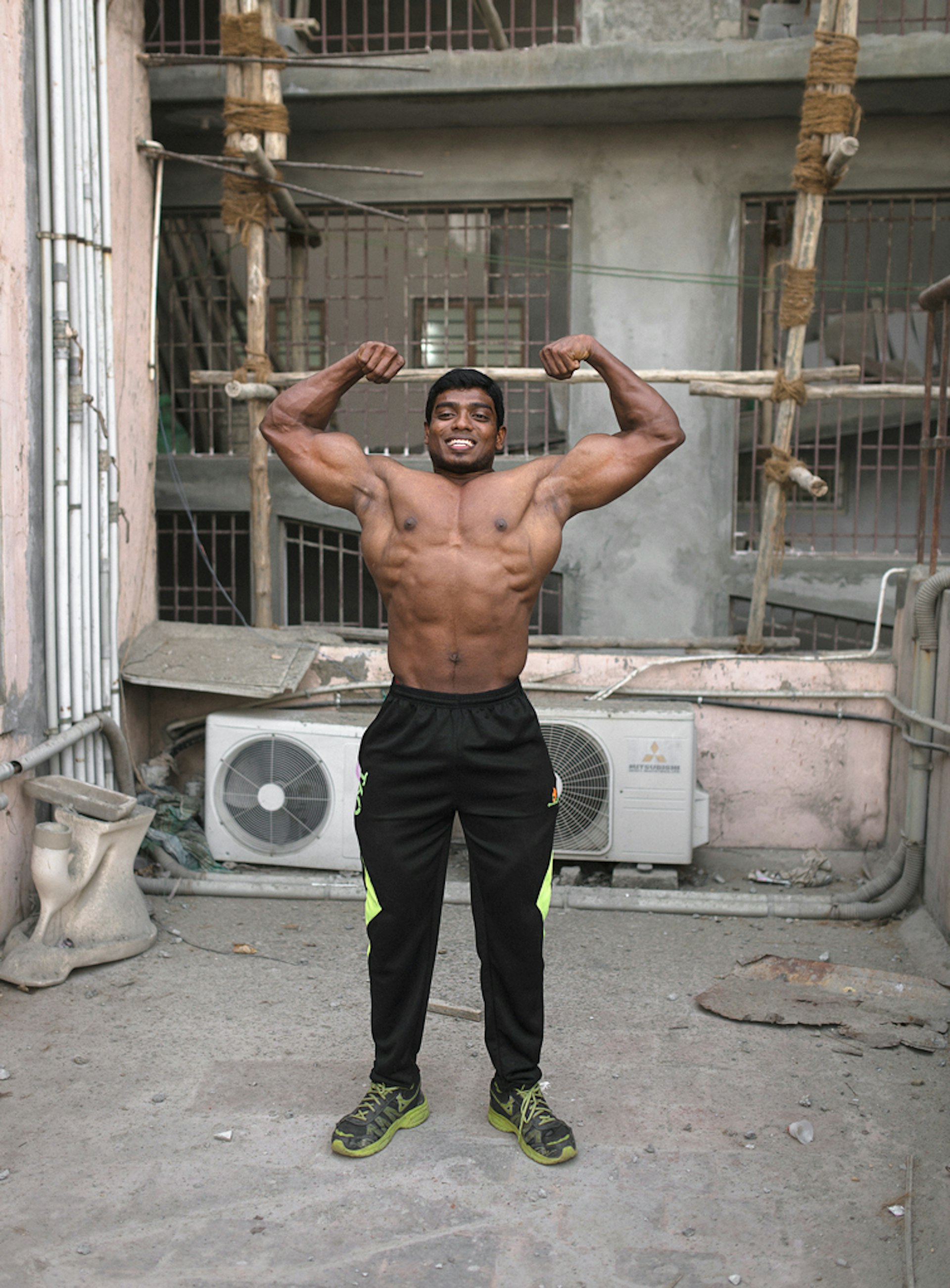
Aji proudly shows off his physique to onlookers during a break from training.
Aji’s plans to recover peak fitness are boosted when Mr South India, a competition in Chennai cancelled due to the cyclone, is rescheduled one week before Mr India – allowing him to use it as a warm-up event. He travels with other guys from GM’s gym, many of whom are making their first big trip away from home, all of them relishing the camaraderie that this burgeoning community offers.
In Chennai, the scale of India’s bodybuilding scene becomes clear as soon as you step inside the enormous Jawaharlal Nehru Stadium. Sponsors’ logos are plastered everywhere, with countless pop-up stalls selling imported protein supplements and training aids. One vendor says that the market for these expensive products remains small, but he’s positioning himself to build a business around the growing appeal of sculpted muscles.
But Aji is oblivious to all of that. He’s in the middle of a gruelling three-day ‘shred’: preparation that involves restricting his protein-heavy diet to the bare minimum and drastically cutting salt and water intake, just to highlight his muscles. As bodybuilders from each category take their time on stage, Aji grows quiet.
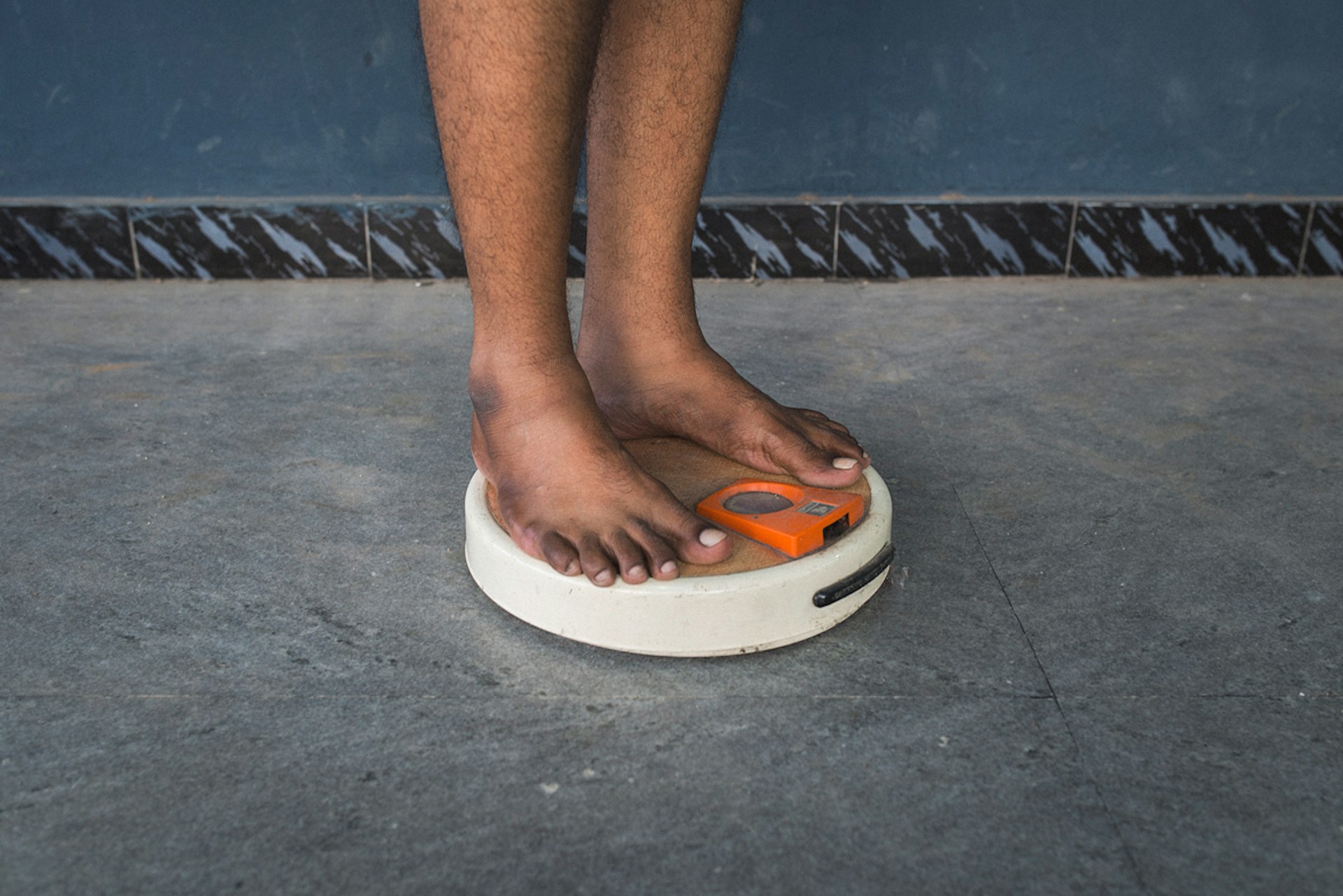
Men weigh themselves religiously before competition day, hoping pounds will disappear.
He’s already sapped of energy, grimacing with every movement, his mouth dried both from dehydration and nervousness. After pushing through his final warm-up exercises, a gym buddy spreads fake tan across his body with a paint roller and, within moments, the call comes. It’s time.
Right on cue, Aji summons his game face, strides onto the stage and gracefully performs his required poses. The biggest cheers and whistles are directed towards the local talent, but Aji’s form and finish see the judges award him third place – beaten by two much older bodybuilders.
Back outside the arena, Aji lies down flat on his back and covers his face with a towel. He’s beyond exhausted, but the performance bodes well for Mr India – where the guys who finished ahead of him would have been placed in a different category. “I’m happy with that result,” he says. “But I only have one week left to prepare; I have to start workouts as soon as possible.”
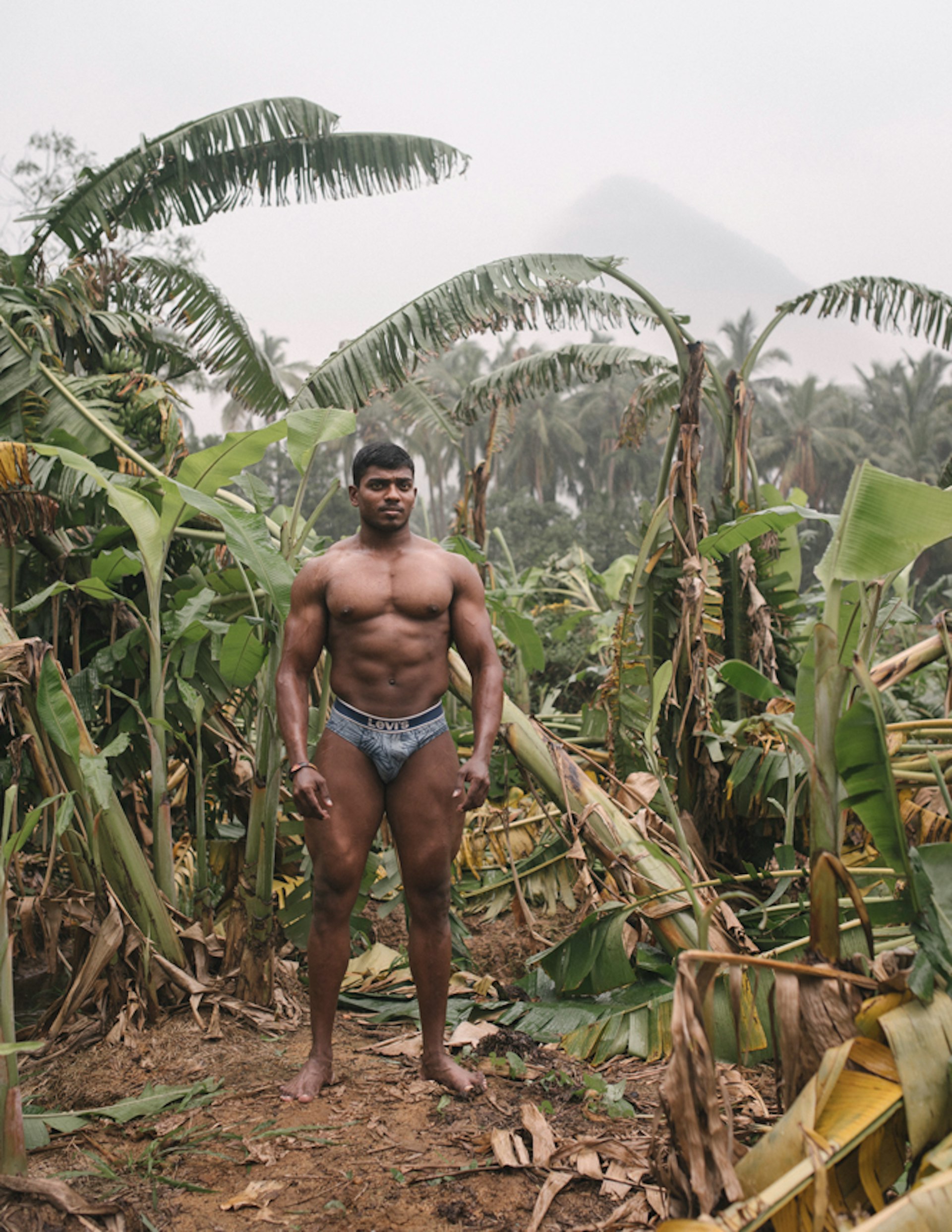
Aji in his backyard the day before taking his first flight – part of an epic journey to Punjab, where he will face the biggest test of his bodybuilding career: Mr India.
For Aji, getting to Mr India requires a journey spanning the length of the country: an overnight flight to New Delhi (his first time on a plane), then a four-hour train to Ludhiana in Punjab, close to the Pakistan border and the Himalayan foothills. This far north, it’s much colder than the tropical climate Aji is used to.
It’s also a predominantly Sikh area where turbans and beards abound. Feeling the chill, and looking out of his comfort zone, the 22-year-old grows reclusive. He doesn’t want to stress his tired muscles, keeping to his room instead. “I need eggs!” is all he’s willing to say.
When the competition finally begins, it erupts with comical bombast. One of the organisers drives a Royal Enfield motorbike onto the stage, bass begins pumping and the host lets loose with a non-stop stream of mind-jarring commentary.
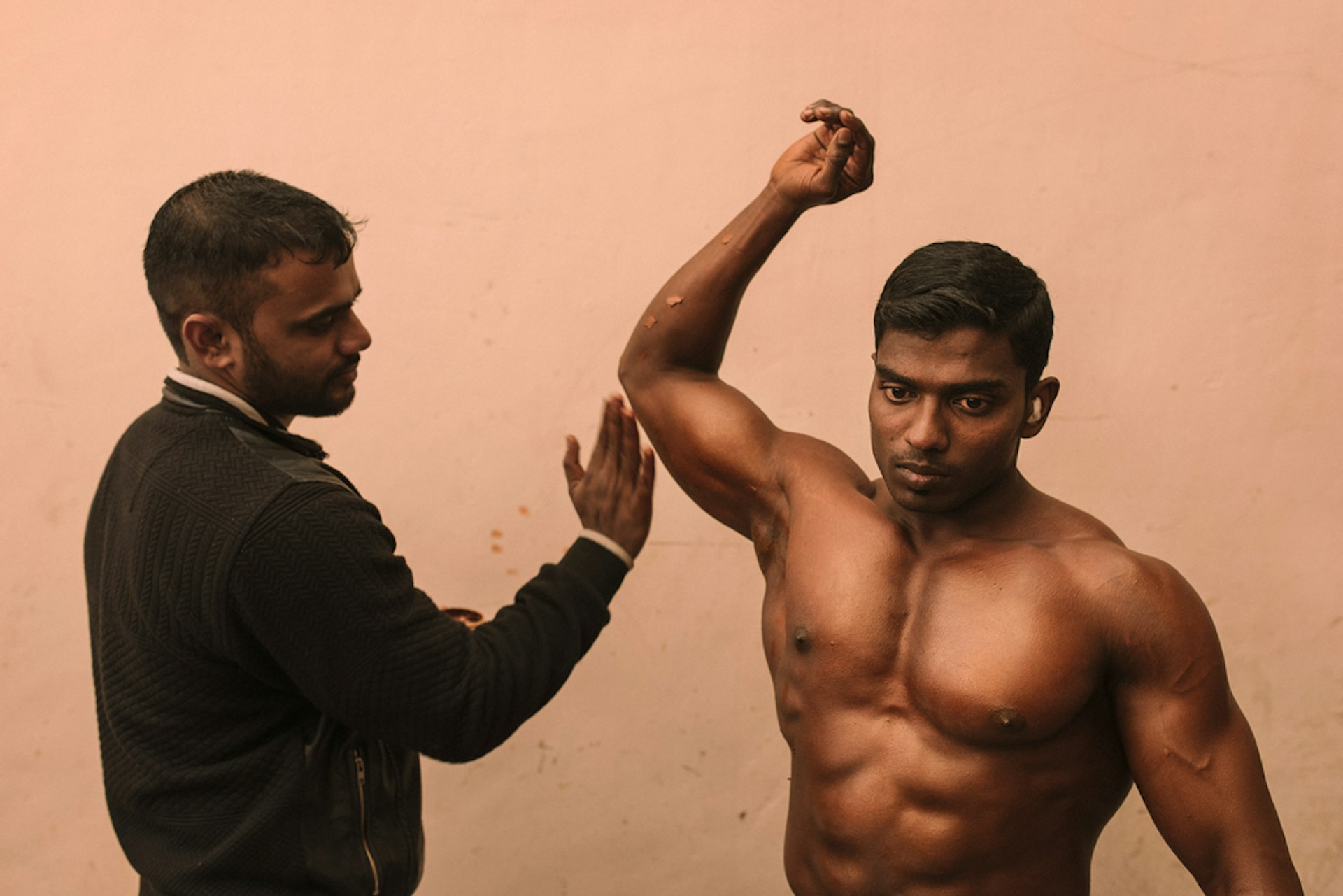
An apprehensive Aji has an extra layer of fake tan applied before taking to the stage at Mr India.
Aji, however, has blocked out everything that’s beyond his own control. Instead he runs through his normal routine, comforting himself with the ritual, before making a last-minute call to GM to discuss strategy.
When the big moment arrives, Aji digs deep and manages to radiate a commanding presence. He’s noticeably bigger than many in the line-up and performs his poses well. But when the judges announce who won’t be progressing, Aji’s number is called.
The look of shock on his face shifts to bewilderment; guys who seem inferior have been voted through to the second round, while many of those who’ve been eliminated alongside him look like stick-insects by comparison.
Aji is gutted, convinced that he’s been unfairly treated. A few rounds later, he’s still barking angrily on the phone to GM when a scuffle breaks out on stage – a result of rising tension among judges over what seem to be questionable verdicts, perhaps even signs of favouritism towards bodybuilders from certain regions. But there’s nothing Aji can do to appeal the outcome.
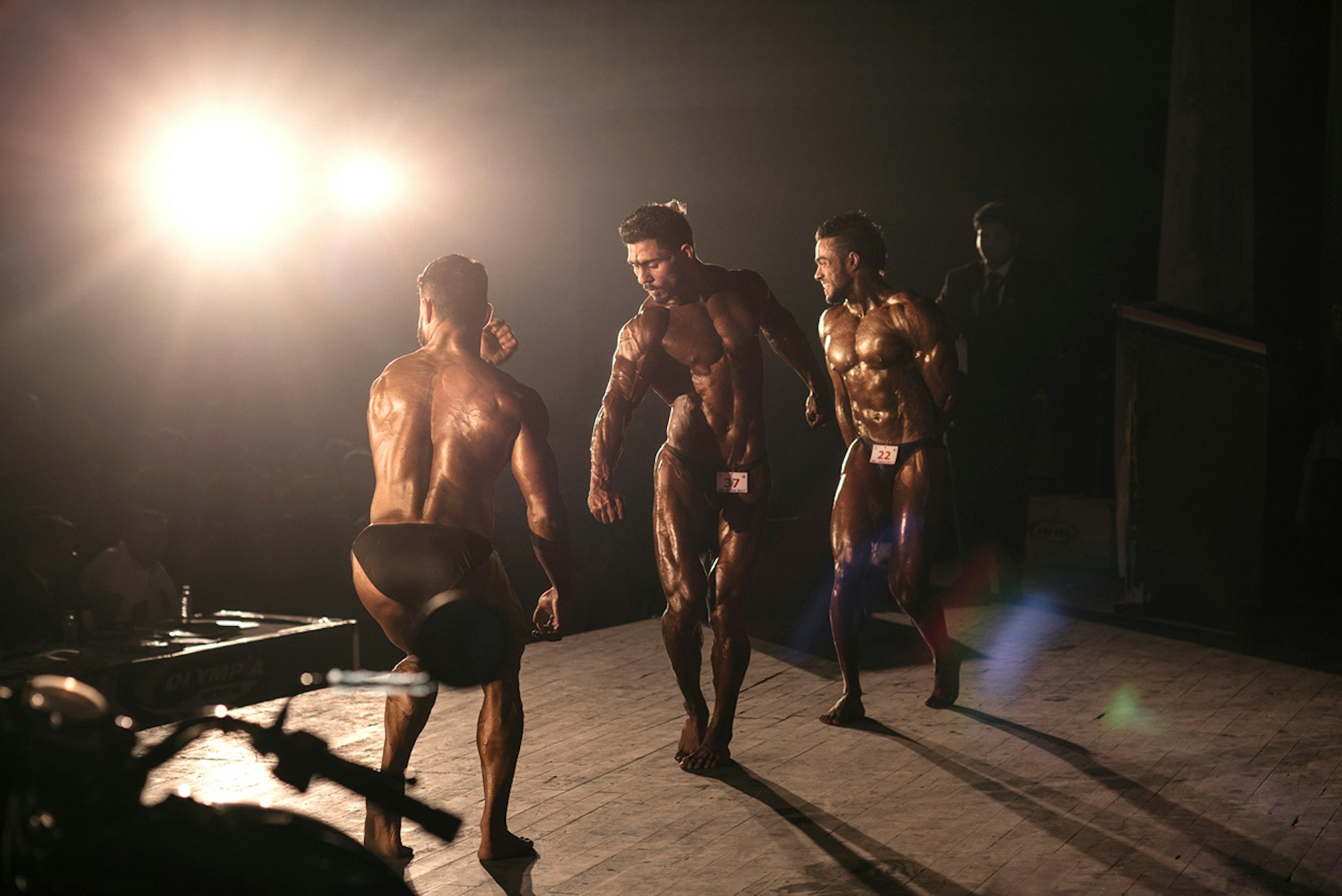
Contestants present their ‘Best Pose’ to judges at Mr India, a crucial moment that has the potential to make or break their careers.
Unlike other countries, Indian judges don’t reveal scores for each bodybuilder’s routines, so their decisions are opaque and can’t be challenged. Organisers are also known for pushing ‘their guys’ forward, leading to disputes between trainers, officials and a proliferation of competing federations.
“Everything seemed fair when I won my first state competition in 2008,” says Biglee Murali, a former champion-turned-trainer standing backstage, sheltered from the chaos.
“But when I tried to win a second time, I understood that certain categories were fixed. In India, we have government jobs for successful athletes. During one contest a judge openly told me, ‘You’re just doing this for a hobby, so we’re giving the title to another guy who’s trying to win a sports appointment.’
“I was busting my balls in the IT industry for 14 hours a day to pay for training and the nutrition, so after that I just said, ‘Forget it.’ Some of the new federations start out honest, but that rarely lasts. Everyone ends up looking out for their own.”
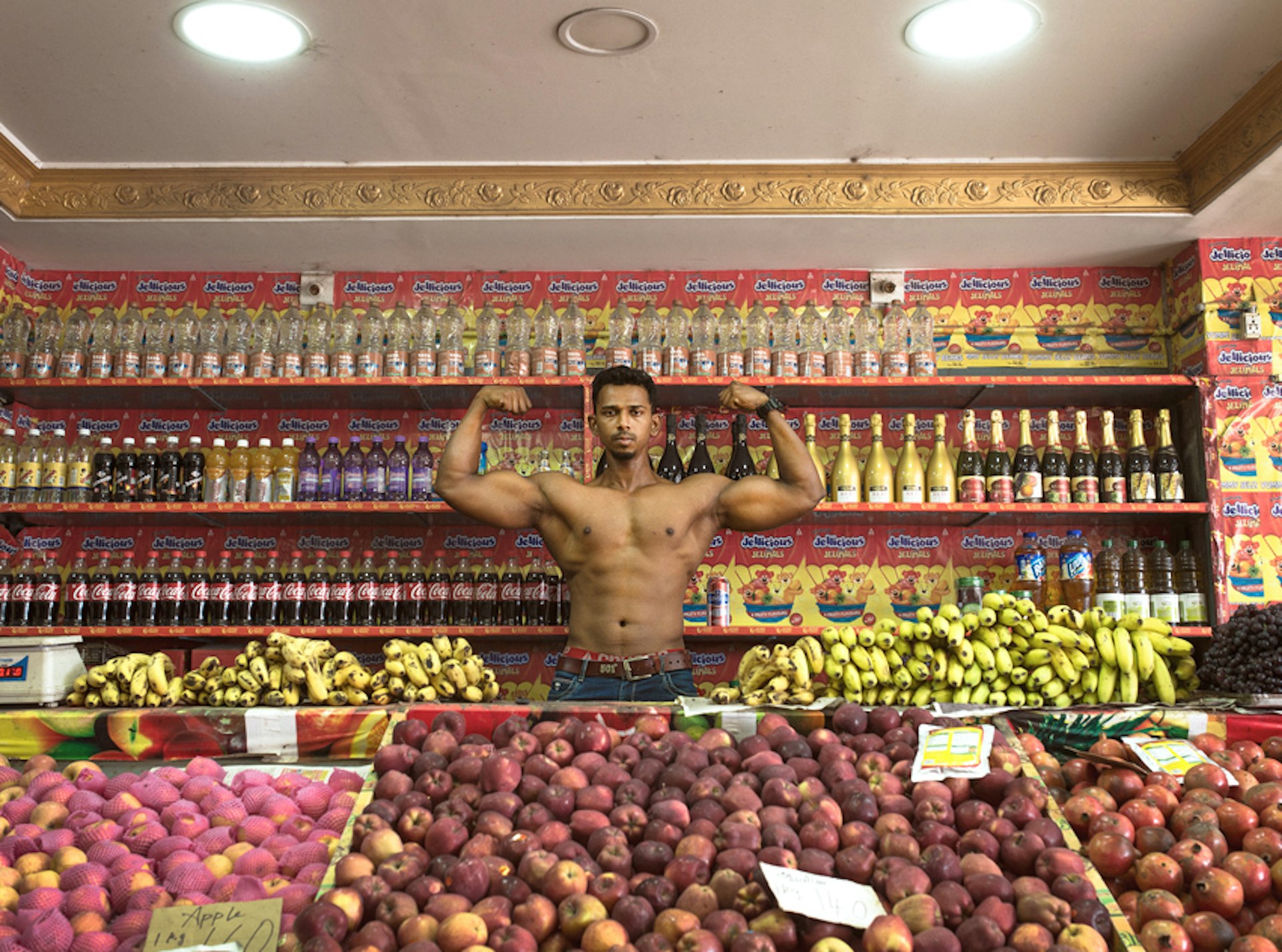
Raja, a 29-year-old Christian convert who owns the largest fruit shop in Nagercoil, flexes from behind the counter.
The spectre of corruption – be it in education, government or sport – has long been seen as a hangover from British colonial rule. Seventy years after gaining independence, India remains a society where people outnumber opportunities – a place where dreams don’t seem to stand much of a chance unless you have the right connections.
As Aji slumps dejectedly at the back of the arena, watching the rest of the contest with glazed-over eyes, you can practically see the dream slipping away from him. All that’s left is a long, sombre journey back home.
“I don’t care about the sponsorship, the money or Mr Asia,” he says later, having had time to reflect and cool off. “I just wanted to be a Tamil from Nagercoil who was able to compete on an equal footing with guys my age from across the country – and prove myself, fairly and honestly, in front of their eyes.
“Bodybuilding has been my drive since childhood. That’s why I decided that, whatever the challenges, I will withstand anything. I will continue this; I will never abandon it.”
This article appears in Huck 66 – The Attitude Issue. Buy it in the Huck Shop or subscribe to make sure you never miss another issue.
Tight, a documentary about India’s bodybuilding scene by Elliott Gonzo, Mark Leaver and Alex King, will be out later this year.
Enjoyed this article? Like Huck on Facebook or follow us on Twitter.
